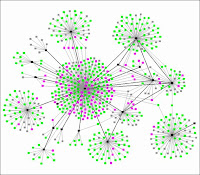- Deregulation
- Globalization
- Technology evolutions
- Commoditization
- Economic instability
Today's IT environment must be built to rapidly adapt. It must be dynamic in nature or it could quickly be an inhibitor to your business success rather than a benefit. In the world of EDI and B2B the traditional approach involved purchasing expensive software, training, consultants and VANS and beginning slow multi-year integration with trading partners. That approach does not meet the demands and requirements of today's business. Multi-year EDI and B2B implementations that are designed to meet one set of business processes are unlikely to be completed before the business process changes.
In today's world, EDI and B2B must be an extension of your ERP and the associated business processes. Changes demanded by your business must be able to be quickly supported end-to-end from your customers to your suppliers, 3PLs and partners. Maturing technology, business and communication standards now make this vision possible.
In the past, EDI and B2B systems were silos of third-party technology that were difficult, expensive and slow to integrate. They were disassociated with your core ERP. They required their own projects, skill sets, staff, training and hardware. They worked independently from your ERP and business processes and required herculean integration efforts. They were a separate entity with a life and cost of their own. That model will not survive in today's world. Companies that have this environment today are likely researching alternatives that are more ERP-centric.
Changes to your business processes and business models should include the ability to make rapid and dynamic changes to your EDI and B2B messages and communications. SAP calls this strategy, Business Network Transformation and has adopted a strategy of using the SAP Netweaver platform and its eSOA strategy to assist here. They invested in an SAP Netweaver based automated business exchange (EDI/B2B managed services company) that enables rapid and dynamic integrations and EDI and B2B implementations for SAP customers. SAP users can connect to this automated business exchange via Netweaver-to-Netweaver connections, IDocs, and tRFC.
SAP is now creating "service extensions" to the most common business processes:
- SNC - Supplier Network Collaboration
- TMS - Transporation Management
- Orders to Cash
- Procure to Pay
- etc.
These service extensions enable EDI and B2B communications with trading partners to be simply activated in an on-demand model. This is a different paradigm for EDI and B2B that is SAP ERP-centric. This model has many advantages over traditional EDI:
- No hardware required
- No integration scripts
- No integration development projects
- No multi-year EDI roll-out projects
- Quick activation and implementations
- Rapid and dynamic changes
- Fixed fee based manage services
In addition, since this is an SAP centric approach, SAP already knows what data is both consumed and produced by their applications and supported business processes. This enables integrations to often be pre-built in the automated business exchange which saves a great deal of time and money for the company utilizing it.
************************************************http://b2b-bpo.blogspot.com/
************************************************
